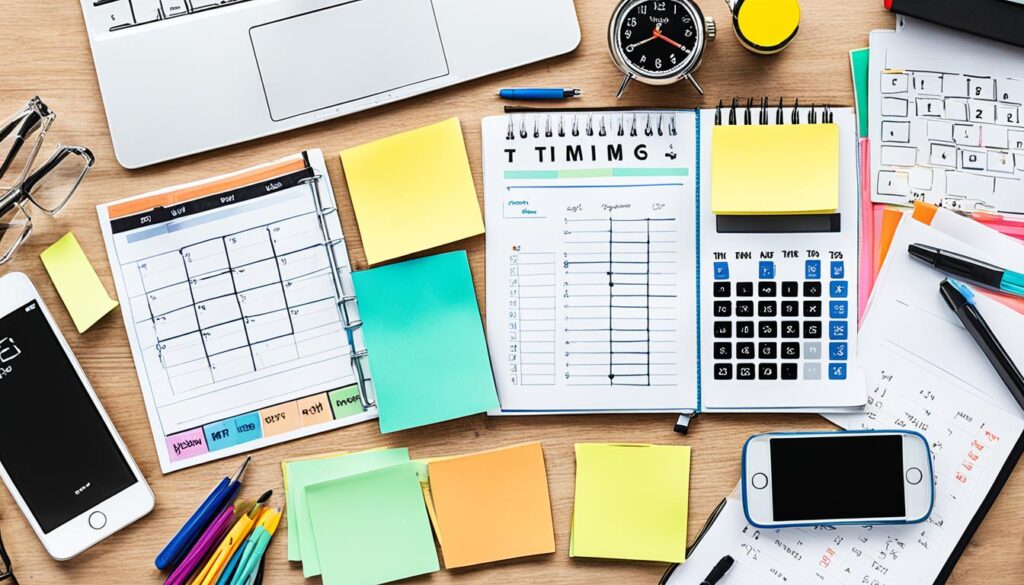Unlock Success with Time Management Examples

“You will never find time for anything. If you want time, you must make it.” – Charles Buxton
Time is the most precious resource we have, and how we choose to manage it can make all the difference in our success and happiness. In today’s fast-paced world, effective time management has become a critical skill that can transform our lives. It allows us to accomplish more, reduce stress, and create a sense of balance in our daily routines.
Whether you’re a student, a professional, or someone looking to make the most of each day, understanding and implementing effective time management strategies can unlock your fullest potential. By prioritizing tasks, setting clear goals, and utilizing practical tips and examples, you can take control of your time and achieve remarkable results.
Key Takeaways:
- Effective time management is crucial for success and happiness.
- Prioritize tasks and set clear goals to make the most of your time.
- Implement practical time management strategies that suit your lifestyle.
- Unlock your fullest potential by taking control of your time.
- Manage your time wisely to achieve remarkable results.
The Impact of Time Management on Stress Reduction
Time management plays a significant role in reducing stress levels. By having a carefully planned timetable and prioritizing tasks, you can experience a greater sense of control over your life. This feeling of control empowers you to maintain concentration and organization, leading to a reduction in stress levels.
Effective time management enables individuals to allocate dedicated time slots for tasks, avoiding the constant pressure of falling behind in responsibilities. For example, consider a student who efficiently manages their study time by creating a schedule that includes specific blocks for different subjects. By adhering to this schedule, the student can confidently approach exams without the anxiety of leaving study material until the last minute.
Similarly, professionals can benefit from effective time management skills. By implementing time management techniques such as prioritizing tasks based on importance and creating realistic deadlines, professionals can alleviate the stress caused by a heavy workload. With a clear plan in place, they can confidently tackle each task and maintain a better work-life balance.
The Pomodoro Technique
One popular time management technique is the Pomodoro Technique. This technique involves breaking work into 25-minute intervals called “Pomodoros,” followed by a 5-minute break. After completing four consecutive Pomodoros, a longer 15-30 minute break is taken. This technique helps maintain focus and prevents burnout, ultimately reducing stress levels.
By incorporating effective time management practices into your daily routine, you can prioritize tasks, stay organized, and allocate dedicated time for each responsibility. This allows you to approach your activities with a calm and focused mindset, leading to reduced stress levels and increased productivity.

Enhancing Productivity through Time Management
Effective time management techniques can significantly enhance productivity. By incorporating specific strategies and utilizing the right tools, you can make the most of your time and accomplish more in less time. Here are some key time management strategies and tools that can help you boost your productivity:
1. Set Clear Goals and Deadlines
One of the most effective time management strategies is setting clear goals and establishing deadlines. By defining what you want to achieve and creating specific deadlines for each task, you create a sense of purpose and urgency. This motivates you to work diligently and stay focused, increasing your productivity.
2. Prioritize Tasks
Another crucial aspect of effective time management is prioritizing tasks. Identifying the most important and urgent tasks allows you to focus your energy and efforts on activities that will yield the greatest results. This helps you avoid wasting time on less important tasks and ensures that you stay on track.
3. Eliminate Unproductive Activities
To maximize your time management efforts, it’s essential to eliminate unproductive activities that don’t contribute to your goals. Identify time-wasting habits and distractions that hinder your productivity (such as excessive social media use or unnecessary meetings) and make a conscious effort to reduce or eliminate them. This frees up more time for high-value activities.
4. Leverage Time Management Tools
There are numerous time management tools available that can help you streamline your workflow and boost your productivity. These tools can assist with tasks such as task prioritization, time tracking, and project management. Some popular time management tools include:
| Time Management Tool | Description |
|---|---|
| Todoist | A task management app that allows you to organize and prioritize your tasks, set deadlines, and track progress. |
| Pomodoro Technique | A time management method that involves working in focused bursts (usually 25 minutes) followed by short breaks to maximize productivity. |
| RescueTime | A time management app that tracks how you spend your time on various websites and applications, providing insights to help you identify time-wasting activities. |
By leveraging these time management tools, you can streamline your tasks, stay organized, and efficiently manage your time, ultimately leading to increased productivity.
Implementing effective time management strategies and utilizing the right tools can make a significant difference in your productivity levels. By setting clear goals, prioritizing tasks, eliminating unproductive activities, and leveraging time management tools, you can enhance your productivity and accomplish more in less time.

Creating a Sense of Balance with Time Management
Time management is crucial for achieving a sense of balance in our lives. As a student or professional, you often face multiple responsibilities and demands on your time. By effectively managing your time, you can prioritize tasks, reduce stress, and create a harmonious equilibrium between your personal and professional life.
Setting Boundaries
One key aspect of time management is setting boundaries. Establish clear guidelines and limitations for your time and energy. Learn to say “no” to activities or commitments that do not align with your priorities or contribute to your overall well-being.
Prioritizing Self-Care Activities
Your well-being should always be a top priority. Allocate time for self-care activities such as exercise, meditation, or hobbies that bring you joy and rejuvenate your mind and body. Prioritizing self-care not only enhances your physical and mental health but also equips you with the energy and focus to tackle your responsibilities more effectively.
Allocating Time for Relaxation and Quality Time
It is vital to have dedicated moments for relaxation and quality time with loved ones. Schedule breaks and leisure activities to recharge and unwind. Spending quality time with family and friends strengthens relationships and promotes a sense of fulfillment and happiness.

Effective time management ensures that you have time not only for work or studies but also for the things that truly matter to you.
Remember, finding balance is an ongoing process, and it requires discipline, flexibility, and self-awareness. By implementing these time management strategies, you can achieve a sense of equilibrium and experience improved mental health, enhanced relationships, and greater overall satisfaction with life.
Conclusion
Effective time management is the key to unlocking success and achieving your personal and professional goals. By implementing practical time management techniques, honing your time management skills, and utilizing the right time management tools, you can take control of your time and experience the transformative power of efficient time management.
Remember, managing your time is not just about being productive; it’s about living a better life. By mastering the art of time management, you can create a sense of balance, reduce stress levels, and enhance your productivity. Prioritize your tasks, set clear goals, and leverage time management tools and apps to streamline your daily activities.
Start implementing these strategies today and unlock your true productivity potential. Embrace the art of time management to lead a more fulfilling and successful life.






